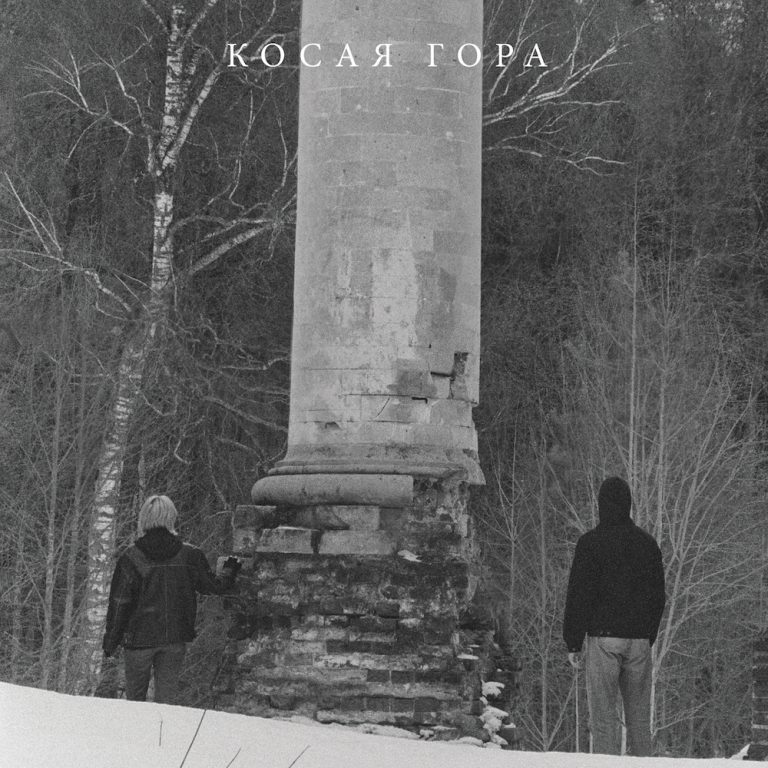It is always interesting and enticing when a records seems to belong to multiple different time periods at once. It feels as if the earlier side of the music lives in the ‘before’ yet anticipates the ‘after’, and the later side looks back on what cannot be anymore. Kosaya Gora (Oblique Mountain), the new project by Kedr Livansky and her longtime collaborator Flaty, seems to bear witness to and reflect on at least three time periods. The musicians began working on this records during COVID lockdowns and as Yana Kedrina (Kedr Livansky’s real name) put it: “[When] quarantine came… it became important to immerse ourselves in the meditative”. Then we saw the return to relative normality after the pandemic was pretty much over with, and, finally, the year 2022, with the start of the war. Kosaya Gora worked on their debut album between these three periods.
Kosaya Gora masterfully employ their eclectic musical influences, but also don’t shy away from ground that’s newer and less explored by these musicians. While they were mostly known for their electronic sounds, Kosogor sees them venturing into the world of guitar music in the same lo-fi setting that the listeners are used to seeing them in. Moreover, the hypnotic vocals by Yana Kedrina not only evoke a very rural and close-to-nature feeling, but these musical landscapes are very contextual. For instance, her vocals on “Dust” are very reminiscent of traditional Eastern European singing, which transports the listener exactly to where the artists were when making this album.
For Kosaya Gora, lyrics and music are one and the same and cannot be properly taken apart. The style of lo-fi folky dreampop is not an incidental choice; this is the sound of their youth within the Russian underground music scene and Kosogor is not only nostalgic, but also an ode to this music and this period of time in their lives. The lyrics are written in the same vein and are drawn from various influences, such as classical Russian poetry of the 19th century and American poetry (“Motorcyclists Die” features several lines from J. Blake Gordon’s poem “so what”). However, most importantly, quite a few of Kedrina’s lyrics reference youth but in an extremely poetic manner, for instance, “Te Slova” is written as a dreamy reminisce on school days, lined notebooks, drawing animals in them and pretending that they are jumping around the lines.
Lyrics in other songs, such as “Miliy”, read almost like poems from the romantic period not unlike those by Vasily Zhukovsky or even Friedrich Schiller. Lastly, the track “Empty Realm” is written in an entirely made up language, which Kedrina calls an Elvish dialect or “a language of dreams.” Sure, a lot of this sounds highly contextual and may come across as only intelligible to those that witnessed the Russian underground music scene, however, there is a reason why Kedr Livansky is a name known well outside of Russia. Yana Kedrina almost never misses in drawing listeners in with her hazy approach to music even when the lyrics are in Russian. Even if listeners to Kosogor cannot exactly put themselves into the artists’ shoes, this abstract and seemingly unstructured album will provide for a great contemplative experience.
Not only is Kosogor the very definition of ‘lo-fi’, it also bears an extremely loose structure which creates the feeling of having a hazy mind where thoughts don’t really tie up in a sequence but rather float about and surface randomly. This is not lazy production, this is entirely intentional. While it reaches the goal of being meditative, it is also another side of the current Russian music scene. There are musicians that make direct political statements about the war, however, there are artists (and just as importantly — people) who have been utterly lost throughout 2022 and couldn’t put it in to words or sounds to describe their feelings. Kosogor achieves that sense with abstract structure that feels like home to those of us who are at a loss for words and thoughts — there is just the feeling of a collective heartbreak. There is no sense in determining whether or not this album was intended to have such an effect, but this is exactly that feeling of witnessing and reflecting on the ‘before’ and the ‘after’. The context grows on the record out of its own accord; there is a reason why the lyrics to “Te Slova” which in translation read: “So that there’s no sadness, so that there’s no war / So both me and you surely could make it to the spring” come across in a way that is specific to 2022 and, unfortunately, onward. However, the larger point is that Kosogor is capable of providing companionship in these grim times, although it has been written prior to them beginning.
Kosogor is an album that no fan of lo-fi music should sleep on, however, it is also multidimensional. Kedr Livansky and Flaty skilfully combine their eclectic music tastes into this record, while enveloping it in a shroud of memories and dreams of the past. It was recorded in rural Russian villages and Yana Kedrina succeeds at channeling the moods and settings of these places. This record was created at the turn of the times and even if the artists did not set out to reflect that, it is very much aware of its surroundings. This is a fantastic contemplative record, and there may even be a benefit in not understanding the lyrics, but rather letting oneself get immersed in the raw, unpolished but stunning sound of Kosaya Gora.

